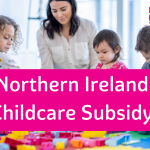UN Special Rapporteur: Levels of child poverty not just a ‘disgrace’ but a ‘social calamity’
The UN Special Rapporteur on extreme poverty and human rights has published the final report on the United Kingdom of Great Britain and Northern Ireland.
Employers For Childcare provided written evidence and met with Professor Philip Alston during his visit to Belfast in November 2018. In our response to the UN Special Rapporteur, we highlighted our work with families, employers and childcare providers. We voiced our concerns that welfare changes are having a significant, negative impact on families and childcare providers, and on society and the economy more broadly. There is a lack of adequate support to ensure that childcare is affordable and accessible for all, both to access and to deliver.
This is in the context of rising levels of child poverty across the UK. Relative child poverty rates are expected to increase by 7% between 2015 and 2021 and overall child poverty rates to reach close to 40%. According to Professor Alston, this “would not just be a disgrace, but a social calamity and an economic disaster rolled into one.”
We shared first-hand accounts from parents who took part in our Childcare Survey 2018 to show the financial impact of the Government’s lack of investment to ensure quality childcare is affordable for families in Northern Ireland:
“I got into arrears with my rent because I sacrificed it to pay for childcare. My husband has no savings at all because we used it to pay for childcare during the nine-week summer break here in Northern Ireland.”
“There were weeks when paying for childcare we survived on food from food banks.”
We also raised concerns that families on Universal Credit must pay for childcare up front and then seek reimbursement. This was acknowledged in the UN report which noted this policy can leave households waiting weeks, or even months, to receive the support they are entitled to with the cost of childcare. This has the potential to push families into debt and prevent them from accessing work. It can also create difficulties for childcare providers, some of whom are not receiving payments on time from parents, and are themselves struggling to be sustainable.
The UN report also acknowledges the mitigation package in Northern Ireland that is set to run out in March 2020 which may have consequences for children and their families. This is of particular concern, as long-term unemployment rates in Northern Ireland are more than twice those of the United Kingdom as a whole. We continue to campaign for the extension of welfare reform mitigations in Northern Ireland beyond 2020.
Notes:
The Special Rapporteur will present his report to the UN Human Rights Council in Geneva in June 2019, at which point the UK Government will formally respond. The Department of Work and Pension has criticised the UN Special Rapporteur report. For further information on the UN Special Rapporteur please see: www.ohchr.org/EN/Issues/Poverty/Pages/VisitUK516November.aspx
Professor Alston is an independent expert in human rights law and was appointed to the unpaid role by the UN Human Rights Council in June 2014. He spent nearly two weeks travelling in Britain and Northern Ireland from 5 to 16 November 2018 and received more than 300 written submissions for his report.






